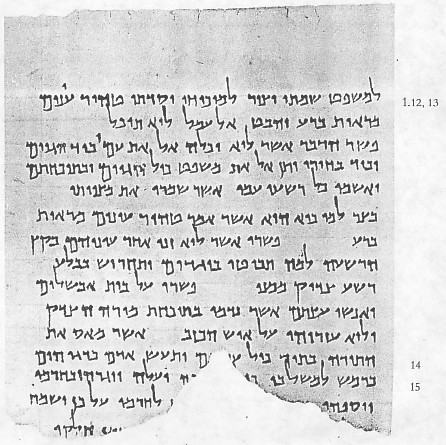
The Pesher to Habakkuk
Page 5
Chapter 1:12 to 15

The first 9 words of this verse are lost presumably in the lacuna at the bottom of the preceding page. The Paleo-Aramaic form for the divine name would have appeared 2 times in the lost portion. The rest of the verse beginning with le-mishpat" (for judgement) is the first word in line one and continues to the 5th word in the line. There is difference in a verbal form used, between the P text and the M text. The next to last word in the verse has variants of the same stem: yakach (to reprove or correct) M has le-hokiach a 5th stem infinitive (to or for correction) P has le-mokicho a prep + participle + suf 3ms (for his correction).
Verse 13 begins without interruption as the next word, 2nd from last in the line.Are you not from antiquity (lit. from the east) YHWH my God, my Holy One? We shall not die! You have placed them for judgement O Rock, you have founded him for his correction.
This interesting verse calls for some comment. The assurance of Habakkuk is that in spite of the terror of the Chaldeans and their strength and Power, Judah will survive. Without doubt he knew the prophecies of Isaiah that predicted the captivity of Judah by the Chaldeans and the future judgement on Babylon and the survival of Judah as the Zion of God. That is the reason for his confidence. "We shall not die."
Habakkuk 1:13
This verse is divided into two parts by the addition of a number of comments or peshers. Part one is from the next to last word in line one to the last in line two at the words "l'o tukal" (you are not able) the rest of the verse begins with the 2nd word in line 8 with "lamah" (why) and is completed with the 3rd word in line 9. In the first portion the following differences are noted. The word " 'eynayim" (eyes) has an edited yod over the word to correct it in the last word on line 1. The 2nd word in line 2 P adds a prep. beth to the word "ra' " (evil). In the next word P adds waw cj. and gives a 5th stem pf 3ms for the M 5th stem imp i.e. "ve-habit" for "tabiyt." In the second portion in line 8 P uses "tabiytu" a 2mpl form while M has "tabiyt" 2ms. Perhaps this is a plural of respect since it refers to YHWH. Then P adds a cj waw to the next to last word a 5th stem 2ms "tachariysh" (you keep silent).
Worth remarking about is the use of "eth" (sign of accusative) with indirect objects in the peshers. 2 examples of this can be seen in lines 3 and 4 where "eth" is preceded by " 'el" preposition (to)
You have purer eyes than to behold evil and you are not able to consider corruption, why do you watch the deceitful, keeping silent when the wicked swallows up those more righteous than he.
Habakkuk 1:14
This verse beginning with the 5th word in the line marked "14" and ends on the next line with the 3rd word "bo," translated (over them), has only one variation from the M text. The first word in the verse omits a he from the end of the word "and you make" which is a common spelling of the word, Otherwise the verse is the same.
And you make men as the fish of the sea, as creeping things having no ruler over them.
Habakkuk 1:15
The next word after "bo" should be "kuloh" (all) the beginning of verse 15 but it is difficult to be sure since there the lamed and he are lost in the lacuna. In P it was probably spelled with a waw inserted after "K" which can be seen. Then this verse follows with some variation from the M text and is confused by a portion of the 2nd word being lost in the lacuna. The 3rd word in the verse in P is 1st stem 3ms "ya'alah" (He raises up) which in M is "he:alah" a 5th stem 3ms (he causes to be raised). P adds a cj waw to the next word, a verb meaning catch. "yegorehu" has a 3ms suf but it speaks of men as fishes and we would expect a 3mpl suf which is the way the translators render the word. The first word in the next line (last) omits an aleph which is a misspelling. Then the lacuna confuses the section because the word following those lost in the lacuna does not follow in this verse. A short pesher may have been in the lacuna and the word that should have followed and would be presumed to be in the lacuna is "be-machmarto" (in their seine or net)
All of them take up with a hook and catch them in their net and gather them in their seine. Therefore they express glee and exult.
To read the translation of the entire page click here
Return to Habakkuk Directory
Go Back to Moellerhaus Homepage